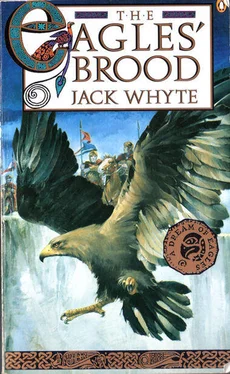"That was foolery, that nonsense back there. I could have been killed...would have been if you hadn't arrived. That would have been no great loss, but I can see now that you and the others would have wasted time and effort turning the country upside-down looking for me. It was criminal and stupid. Forgive me, Cay. I'll never take off again without letting someone know where I can be found. But how in the name of all the Roman gods did you know where to find me?"
"Bodies," I said. "Willing, female bodies. You saw them there when we passed through the first time, and you didn't get to use them, and then you found yourself with three days off within ten miles of them. It wasn't difficult. I know you, Cousin. But you are right. It was stupidity, although had you been killed, I doubt that it would pass as no great loss. Not from your grandfather's viewpoint. In his eyes, you were bred and trained for a purpose, and it wasn't to get yourself killed in a den of thieves and whores."
He said no more for a while, then, "How bad is he? How much time have we lost because of this?"
"I don't know how bad he is, but he must be really ill, or they wouldn't recall us from patrol. It'll take us about three days to reach Camulod at this speed—less if we cut down on sleep. As to time lost, no more than an hour, all told. I had to come this way and I wasted no time looking for you in Glevum. The fight was brief, long as it seemed."
I stood upright in my stirrups and looked back the way we had come. We were in a stretch of open grassland, cleared of trees years earlier by a farmer whose time had long since passed and now showing signs of reverting to forest. I saw a pall of black smoke above the trees in the far distance. We fell back into silence and rode each with his own thoughts.
We changed horses regularly and the miles dropped away behind us. When darkness fell, we took our horses onto the roadbed, riding between the trees on either side, seeing our way by moonlight. We stopped and slept for a brief spell after the moon went down, and were back on our way before the first flush of dawn, stopping only to void our bladders and bowels on that second day. Each time I got down from the saddle for such a purpose, I felt that I would never be able to walk properly again, and the thought of hauling my aching body back up into the saddle daunted me. But we had no trouble on the road and by mid-after- noon of the third day we came in sight of Camulod.
We had been riding through our own home territories for some time by then and had learned from our own outposts only that Varrus had fallen, breaking both legs and several ribs in rolling down the hillside. He had become congested in his lungs and had been spitting blood for the past eight days. Grim-faced, we travelled on, to be met by Aunt Luceiia at the entrance to the villa. She looked fragile, yet somehow indomitable, as she smiled at us through her tears.
When we had kissed her, Uther spoke. "How is he, Grandmother?"
"In great pain. But he's a stubborn man and will not die before he speaks to both of you."
There it was. We both knew there was no point in uttering stupidities about his not dying.
"Can we go to him now?" I asked.
"Of course you can. He is in his day-room." We left her and walked rapidly towards the room that had been my own grandfather's day-room. Both of our fathers were there already, one on either side of the bed. Patricus, head of the Colony's Council, was there too, white-haired and solemn. I could have wept when I saw what had happened to my great-uncle since we had left, just two short weeks before. He was a different man, a stranger to my sight. Only the eyes, set in the sunken, withered, pain-racked face showed me the Publius Varrus that I loved, and even they were misted with pain.
"Uther," he said. "And Caius. Welcome home." His voice was a hoarse whisper. He held out a clawlike, shrunken hand to each of us, and as I took his hand in my own I saw how the skin of his once-mighty wrist hung in folds and wrinkles from the bones. I pressed his hand to my cheek, feeling the wetness of my tears between the two surfaces. "What are the tears for, boy? This is the way of all men. We all have to die. I have lived far longer than I ought to have, and I have lived well. Have you ridden far?" I nodded my head, unable to speak. "I thought so." The parchment whisper held a trace of the old humour. "You smell like horses, both of you. Caius, this was your grandfather's bed. He enjoyed it for years before he died. I've had it only for days. I do not intend to die in it with the smell of rancid horse sweat in my nostrils." His fingers squeezed my hand gently. "Go you and bathe, both of you. I'll still be here when you are clean. Then I shall speak with each of you alone." His hand pushed gently against mine, "Go. I will not die before I speak with you, I promise. Picus, are the baths prepared?"
"Of course they are, Varrus. Have you ever known them not to be?"
"Aye, I have. Once. The hypocausts were blocked. But you were not here then."
My father spoke to us. "Do as he says. You'll feel better. And find something to eat. Publius Varrus should have some rest." Unwillingly, we rose to do as we were bidden.
When we returned, clean smelling and refreshed, we found Aunt Luceiia sitting by the bedside, holding one of her husband's wrinkled hands between her own. His eyes were closed, but he opened them as he heard our footsteps crossing the room and he smiled at us. "Ah," he whispered. "That's better. These are the boys I know. Cay, go with your Aunt Luceiia and keep her company while I speak with Uther. Uther, come here and sit where I can see you."
Aunt Luceiia and I left the two of them alone and I closed the doors behind me as we left the room. She led me through the house into the family room, her own domain, and nodded for me to sit on one of the couches. "Well, Caius," she said, "Publius Varrus will not be here with us much longer, now." I swallowed the painful lump in my throat and managed to ask her what had happened. She shrugged her shoulders in a gesture remarkably like the one I had seen her husband use a thousand times. "Nobody knows, Cay. He won't tell us, and nobody saw it. He had been down here at the villa all that afternoon and was on his way home to the fort when it happened. It was after dark, we know that much, for if it had been earlier, he would have been seen." Her face crumpled and she began to weep. I crossed to where she sat and held her as she spoke through her grief. "He always was a strong and stubborn man. Too stubborn to grow old as others do. Too stubborn to admit a loss of strength or youth. I believe he put his horse to the hillside, rather than take the long route up the road. I think he lost his balance and fell from the horse. He never could abide to use a saddle, said he had ridden bareback too long to change his ways.
"Anyway, a pedlar found him at the bottom of the hill early the following morning. His horse was grazing, unhurt, not far away. He had been lying there for hours and was soaked to the skin and chilled with dew." She paused, and then shook her head violently, scattering teardrops. "I hadn't even noticed he had not come home. I had noticed, I mean, but I had not been concerned. He used to sleep here in the villa, sometimes, if he had worked late. I thought that was where he was. How could I think the old fool would try to scramble up the hill like a boy of twelve? And now he's going to die and I'll have all my life to wonder if I might have found him earlier."
I hugged her tightly and tried to reassure her that there was nothing she could have done, but she was not to be consoled so easily.
"Oh, Cay," she sobbed. "I can't believe what this has done to him. All of his flesh has melted! There's nothing left of the man I love but skin and bone and pain and the inner strength that won't let him die!"
Читать дальше









